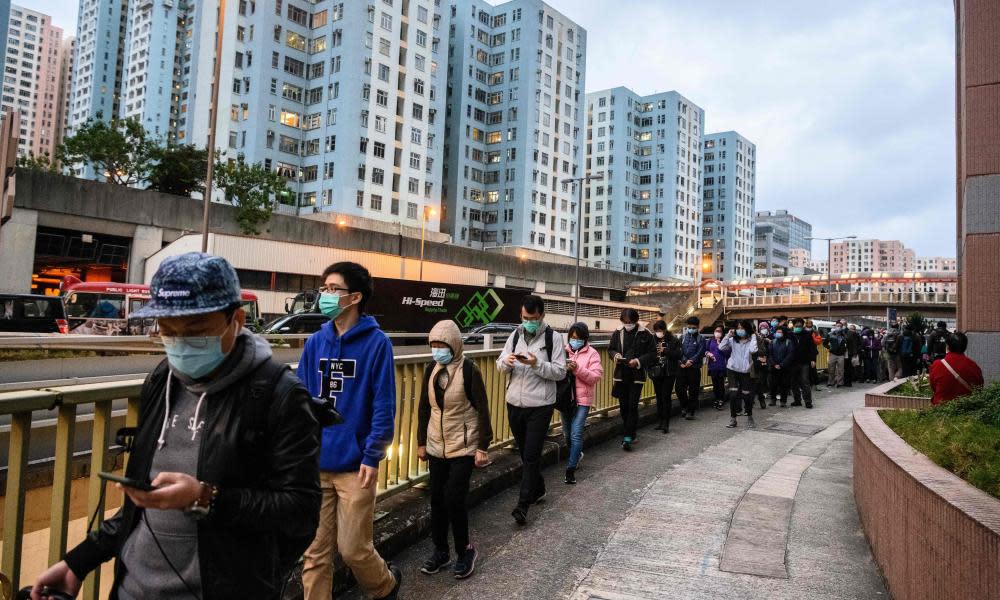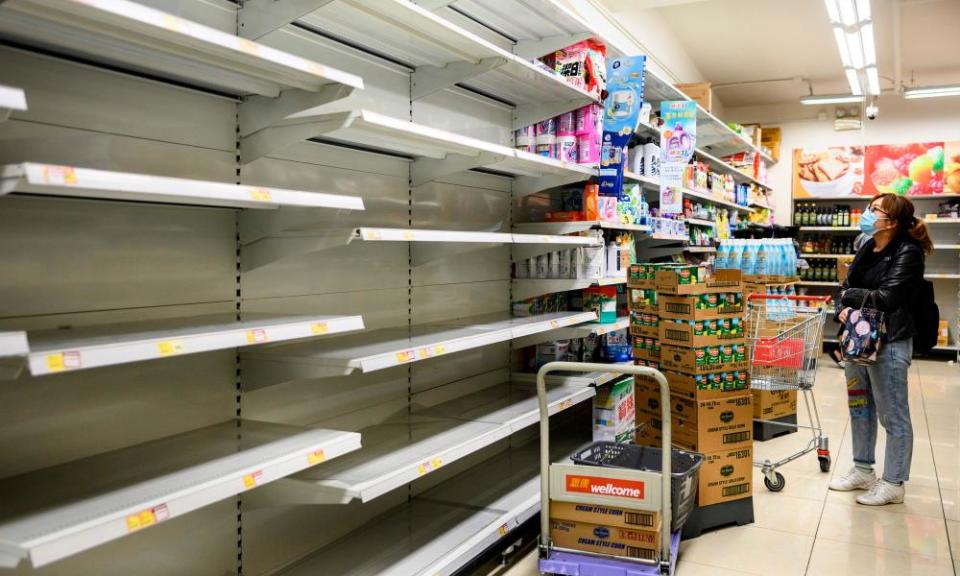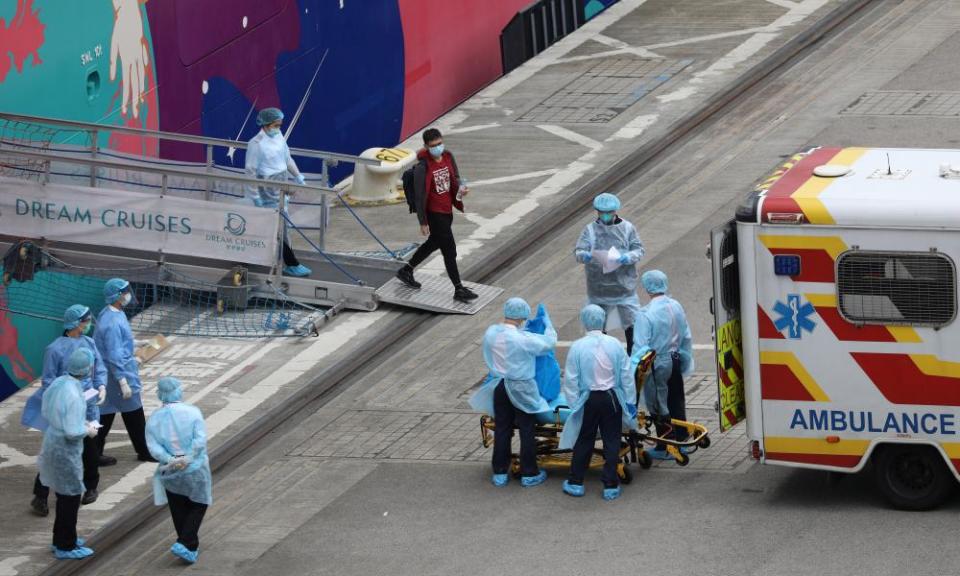Hong Kong faces 'double devastation' as coronavirus and civil unrest take toll

Hong Kong’s economy risks being plunged deeper into recession as the coronavirus outbreak wreaks havoc in the crisis-hit territory, with consumers panic buying staple goods and airlines stopping flights.
Hours after the city’s flagship carrier Cathay Pacific placed 27,000 staff on three weeks unpaid leave, Virgin Australia said on Thursday that it would no longer fly to Hong Kong because it was not “commercially viable”.
John MacLeod, chief executive of Virgin Australia, said: “The Hong Kong market has remained challenging for the airline and demand has continued to decline following ongoing civil unrest. These factors, combined with growing uncertainty around the recent coronavirus outbreak, have led to the decision to cease operating services.”
American Airlines and United Airlines, the two biggest US carriers, said on Wednesday they were suspending flights to Hong Kong until at least the end of the month.
Conditions were as grave now as during the 2009 financial crisis, said Cathay Pacific. “I am appealing to each and everyone of you to help,” said CEO Augustus Tang Kin-wing. “Preserving our cash is now key to protecting our business,” he said.
Carrie Lam, Hong Kong’s chief executive, is under pressure to close all routes into Hong Kong from mainland China in order to stop the spread of the virus, which has killed more than 560 people, one of them in Hong Kong.
A typical morning in Hong Kong right now as people queue for supplies at a pharmacy. pic.twitter.com/4MZtlNeqh7
— Scott Murdoch (@murdochsj) February 6, 2020
She has already ordered all entrants from China to be quarantined for 14 days and has closed two cruise ship terminals after 30 crew on the World Dream vessel anchored in the city’s port on Wednesday were suspected of having the infection. Port health authorities were screening the 3,600 people onboard for symptoms on Thursday.
The measures have caused anxiety in Hong Kong, where memories of the devastating 2003 outbreak of Sars – which is similar to the new coronavirus – are still fresh in people’s minds.
Hongkongers have begun forming long queues in shops and supermarkets amid panic buying for toilet rolls and tissues, largely due to a rumour spreading online on Wednesday that China was going to stop manufacturing toilet paper for the next two weeks.
There was also a run on face masks, vitamins, rice and packet noodles, leaving supermarket shelves empty.

“Looks like a war is coming!” joked a worker at U Select supermarket in Sai Ying Pun on Hong Kong island.
But the loss of visitors from China, who spend millions of dollars in Hong Kong’s many upmarket shops, and from the outside world risks a “double devastation” for the economy, according to retail chiefs.
Hong Kong’s retail trade collapsed 11% in 2019 in the wake of months of street protests by pro-democracy campaigners that caused huge disruption to businesses and daily life. Many shops were shuttered and getting around the city was made difficult by repeated closures of the city’s subway system.
The economy is already in recession – it shrank by 1.2% last year – and now faces even more pain as the normal flood of visitors slows to a trickle.
“We are facing a double-hit devastation,” said Annie Yau Tse, chairwoman of the Hong Kong Retail Management Association. “The loss we are facing is tremendous. It’s about survival.”
Economists at Fitch Solutions Macro research have slashed their growth forecasts for Hong Kong in the wake of the coronavirus outbreak and believe the economy will shrink another 2.6% this year even though the protests have stalled.
“Although the protests seem to have lost momentum amid health concerns, the 2019 novel coronavirus would further weigh on the economy,” they said in a note on Tuesday. “Moreover, we believe that the political outlook in Hong Kong remains fragile, given that the ‘Five Great Demands’ of the protestors remain unmet, which suggests that large-scale protests would easily resume once the coronavirus epidemic subsides.”
Only government spending would make a positive contribution to the bottom line, they said, as consumer spending and tourism faced huge falls.
The tourism sector would be particularly badly hit, they said, as the closure of 11 out of 13 border crossings and the new quarantine measures would see a “significant” reduction of Chinese tourists, who make up three-quarters of holidaymakers.
Business investment has also “taken a pounding” Fitch Solutions added, and could get much worse if the virus spreads more widely within Hong Kong, resulting in a Wuhan-style lockdown.

Trinh Nguyen, senior economist for emerging Asia for the investment bank Natixis in Hong Kong, said the wider Asia Pacific economy faced a gloomy outlook if the coronavirus crisis was not brought under control quickly.
“We know for sure that Chinese tourists are staying home and that is bad news for Macau, Hong Kong, and Thailand,” she said on Thursday. “But other economies like the Philippines and Vietnam will feel it too as the share of GDP is large. So across the region, the impact is negative but more so for Thailand as its dependency on Chinese tourists has increased to now 2.7% of GDP.
“Beyond tourism, the slowdown of China will curb import demand and also disrupt supply chain as many economies in Asia depend on China for imported parts for final production as well as lower Chinese demand for commodities pushing down prices. Vietnam, Singapore, South Korea, Malaysia and Australia are very impacted by this,” she said.


